
Scientific American, informally abbreviated SciAm or sometimes SA, is an American popular science magazine. Many scientists, including Albert Einstein and Nikola Tesla, have contributed articles to it, with more than 150 Nobel Prize-winners being featured since its inception.

China Tom Miéville is a British speculative fiction writer and literary critic. He often describes his work as "weird fiction", and is allied to the loosely associated movement of writers called New Weird.
This article contains information about the literary events and publications of 1638.
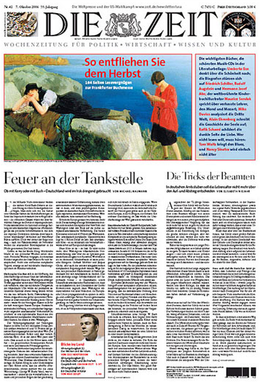
Die Zeit is a German national weekly newspaper published in Hamburg in Germany. The newspaper is generally considered to be among the German newspapers of record and is known for its long and extensive articles.

Noel Joseph Terence Montgomery Needham was a British biochemist, historian of science and sinologist known for his scientific research and writing on the history of Chinese science and technology, initiating publication of the multivolume Science and Civilisation in China. A focus of his was what has come to be called the Needham Question of why and how China had ceded its leadership in Science and Technology to Western countries.
Sinology, also referred to as China studies, is a subfield of area studies or East Asian studies involved in social sciences and humanities research on China. It is an academic discipline that focuses on the study of the Chinese civilization primarily through Chinese language, history, culture, literature, philosophy, art, music, cinema, and science. Its origin "may be traced to the examination which Chinese scholars made of their own civilization."
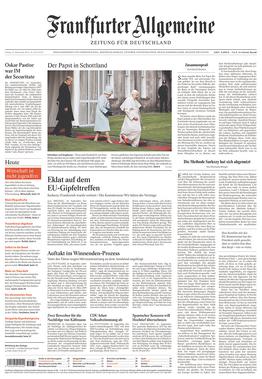
The Frankfurter Allgemeine Zeitung is a German newspaper founded in 1949. It is published daily in Frankfurt. Its Sunday edition is the Frankfurter Allgemeine Sonntagszeitung.
The German Research Foundation is a German research funding organization, which functions as a self-governing institution for the promotion of science and research in the Federal Republic of Germany. In 2019, the DFG had a funding budget of €3.3 billion.

The Academic Ranking of World Universities (ARWU), also known as the Shanghai Ranking, is one of the annual publications of world university rankings. The league table was originally compiled and issued by Shanghai Jiao Tong University in 2003, making it the first global university ranking with multifarious indicators.

The Deutsches Wörterbuch, abbreviated DWB, is the largest and most comprehensive dictionary of the German language in existence. Encompassing modern High German vocabulary in use since 1450, it also includes loanwords adopted from other languages into German. Entries cover the etymology, meanings, attested forms, synonyms, usage peculiarities, and regional differences of words found throughout the German speaking world. The dictionary's historical linguistics approach, illuminated by examples from primary source documents, makes it to German what the Oxford English Dictionary is to English. The first completed DWB lists over 330,000 headwords in 67,000 print columns spanning 32 volumes.

The Science of Nature, formerly Naturwissenschaften, is a monthly peer-reviewed scientific journal published by Springer Science+Business Media covering all aspects of the natural sciences relating to questions of biological significance. It was founded in 1913 and intended as a German-language equivalent of the English-language journal Nature, at a time when German was still a dominant language of the natural sciences. The journal is now published in English.

Ji Xianlin was a Chinese Indologist, linguist, paleographer, historian and writer who has been honored by the governments of both India and China. Ji was proficient in many languages including Chinese, Sanskrit, Arabic, English, German, French, Russian, Pali and Tocharian, and translated many works. He published a memoir, The Cowshed: Memories of the Chinese Cultural Revolution, about his persecution during the Cultural Revolution.
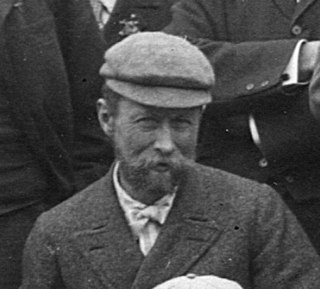
Bailey Willis was a geological engineer who worked for the United States Geological Survey (USGS), and lectured at two prominent American universities. He also played a key role in getting Mount Rainier designated as a national park in 1899. After later focusing more on seismology, he became one of the world's leading earthquake experts of his time.

The China Quarterly (CQ) is a British triple-anonymous peer-reviewed academic journal established in 1960 on contemporary China including Taiwan.
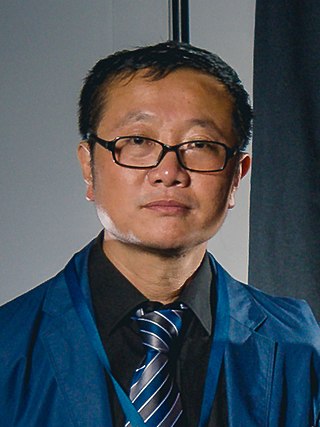
Liu Cixin is a Chinese computer engineer and science fiction writer. He is a nine-time winner of China's Galaxy Award and has also received the 2015 Hugo Award for his novel The Three-Body Problem as well as the 2017 Locus Award for Death's End. He is also a winner of the Chinese Nebula Award. In English translations of his works, his name is given as Cixin Liu. He is a member of China Science Writers Association and the vice president of Shanxi Writers Association. He is sometimes called "Da Liu" by his fellow science fiction writers in China.

The history of the missions of the Jesuits in China is part of the history of relations between China and the Western world. The missionary efforts and other work of the Society of Jesus, or Jesuits, between the 16th and 17th century played a significant role in continuing the transmission of knowledge, science, and culture between China and the West, and influenced Christian culture in Chinese society today.
The year 1584 in science and technology included many events, some of which are listed here.

Cheng Siwei was a Chinese economist, chemical engineer and politician. He was the Chairman of China Soft Science Research Association; President of the Chinese Society for Management Modernization; Director of the Research Center on Fictitious Economy and Data Science, Chinese Academy of Sciences; Dean of the School of Management of the Graduate University of the Chinese Academy of Sciences and Honorary President of East China University of Science and Technology.

Harry Willis Miller was an American physician, thyroid surgeon and Seventh-day Adventist missionary. Miller was a vegetarian and pioneer in the development of soy milk.
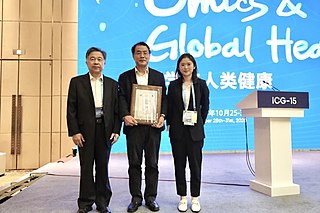
Zhang Yongzhen, also known as Yong-Zhen Zhang, is a Chinese virologist known for his work relating to the COVID-19 pandemic. A professor at Fudan University, Zhang has discovered numerous RNA viruses and created a network of labs dedicated to monitoring new viruses. He led the team that sequenced and published the genome of SARS-CoV-2, the virus that causes COVID-19, in early January 2020.